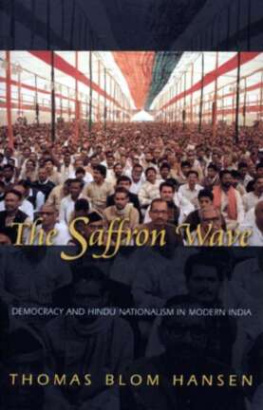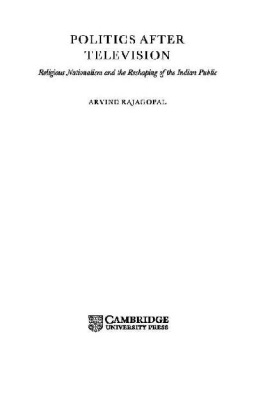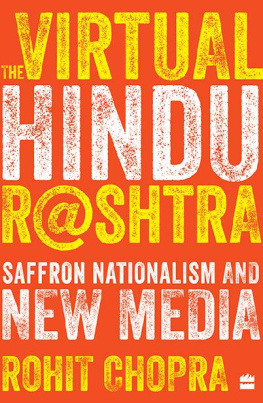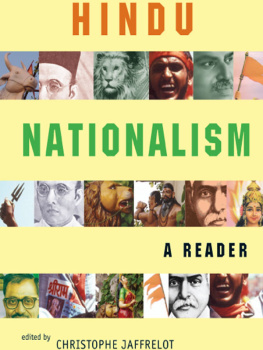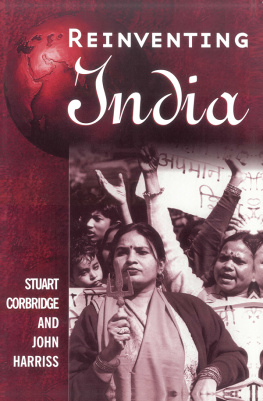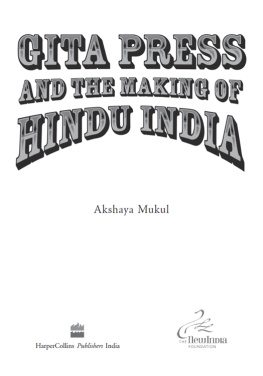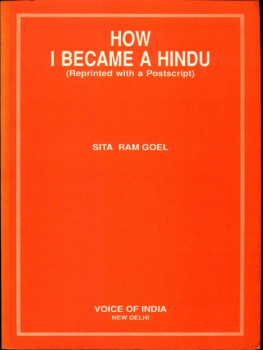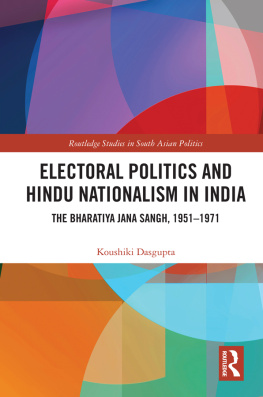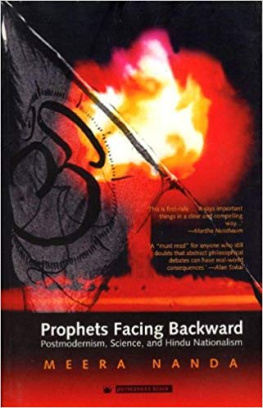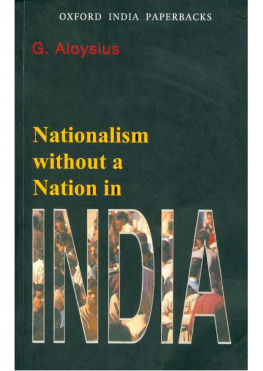Hindu Nationalism, History and Identity in India
When the Hindu nationalist Bharatiya Janata Party (BJP) assumed power in India in 1998 as the largest party of the National Democratic Alliance, it soon became evident that it prioritized educational reforms. Under BJP rule, a reorganization of the National Council of Educational Research and Training occurred, and in 2002 four new history textbooks were published.
This book examines the new textbooks which were introduced, considering them to be integral to the BJPs political agenda. It analyses the ways in which their narrative and explanatory frameworks defined and invoked Hindu identity. Employing the concept of decontextualization, the author argues that notions of Hindu cultural similarity were conveyed, particularly as the textbooks paid scarce attention to social, geographical and temporal contexts in their approaches to Indian history. The book shows that intrinsic to the textbooks emphasis on similarity is a systematic backgrounding of any references to internal lines of division within the Hindu community. Through a comparison with earlier textbooks, it sheds light on the contested nature of history writing in India, especially in terms of nation building and identity construction. This issue is also highly relevant in India today due to the electoral success of the BJP in 2014, and the efforts of the Hindu nationalist organization Vishwa Hindu Parishad to construct a coherent Hinduism.
Arguing that the textbooks operate according to the BJPs ideology of Hindu cultural nationalism, this book will be of interest to academics in the field of South Asian studies, contemporary history, the uses of history, identity politics and Hindu nationalism.
Lars Tore Flten is an Associate Professor in South Asia Studies at the Department of Culture Studies and Oriental Languages in Oslo, Norway. His publications include Hindu Nationalist Conceptions of History, in South Asia: Journal of South Asia Studies, 2012.
Routledge Studies in South Asian History
For a full list of titles in this series, please visit www.routledge.com
10 Gender and Radical Politics in India
Magic moments of Naxalbari (19671975)
Mallarika Sinha Roy
11 Bureaucracy, Community and Influence in India
Society and the state, 1930s1960s
William Gould
12 A History of State and Religion in India
Ian Copland, Ian Mabbett, Asim Roy, Kate Brittlebank and Adam Bowles
13 Hindu Mahasabha in Colonial North India, 19151930
Constructing nation and history
Prabhu Bapu
14 Cinema, Transnationalism, and Colonial India
Entertaining the Raj
Babli Sinha
15 Environment and Pollution in Colonial India
Sewerage technologies along the sacred Ganges
Janine Wilhelm
16 The Kashmir Conflict
From empire to the Cold War, 194566
Rakesh Ankit
17 Hindu Nationalism, History and Identity in India
Narrating a Hindu past under the BJP
Lars Tore Flten
First published 2017
by Routledge
2 Park Square, Milton Park, Abingdon, Oxon OX14 4RN
and by Routledge
711 Third Avenue, New York, NY 10017
Routledge is an imprint of the Taylor & Francis Group, an informa business
2017 Lars Tore Flten
The right of Lars Tore Flten to be identified as author of this work has been asserted in accordance with sections 77 and 78 of the Copyright, Designs and Patents Act 1988.
All rights reserved. No part of this book may be reprinted or reproduced or utilised in any form or by any electronic, mechanical, or other means, now known or hereafter invented, including photocopying and recording, or in any information storage or retrieval system, without permission in writing from the publishers.
Trademark notice: Product or corporate names may be trademarks or registered trademarks, and are used only for identification and explanation without intent to infringe.
British Library Cataloguing in Publication Data
A catalogue record for this book is available from the British Library
Library of Congress Cataloging in Publication Data
Names: Flten, Lars Tore, author.
Title: Hindu nationalism, history and identity in India : narrating a Hindu
past under the BJP / Lars Tore Flten.
Description: Milton Park, Abingdon, Oxon ; New York, NY : Routledge,
2017. | Series: Routledge studies in South Asian history ; 17 | Includes
bibliographical references and index.
Identifiers: LCCN 2016022800 | ISBN 9781138670310 (hardback) |
ISBN 9781315617695 (ebook)
Subjects: LCSH: IndiaHistoryStudy and teachingPolitical aspects. |
IndiaHistoriographyPolitical aspects. | HindusHistoryStudy and
teachingPolitical aspects. | HindusHistoriographyPolitical aspects. |
TextbooksPolitical aspectsIndiaHistory. | Bharatiya Janata Party
Influence. | Bharatiya Janata PartyHistory. | HindutvaHistory. |
Identification (Religion)Political aspectsIndiaHistory. | India
Politics and government1977
Classification: LCC DS435.8 .F53 2017 | DDC 954.0072dc23
LC record available at https://lccn.loc.gov/2016022800
ISBN: 978-1-138-67031-0 (hbk)
ISBN: 978-1-315-61769-5 (ebk)
Typeset in Times New Roman
by Apex CoVantage, LLC
This book is based on my doctoral dissertation, which I defended in 2013. I collected the source material for the study during three research visits to Delhi, in December 2004, January and February 2010 and October 2011. I am deeply grateful to the staff at DKPD Publishing in Ansari Road, Delhi for making this study possible. In December 2004, seven months after the BJP was voted out of office, the excellent staff at DKPD managed to get hold of the set of textbooks analyzed throughout this book. These textbooks were indeed difficult to get hold of, and I was close to giving up when DKPD came to the rescue. While in Delhi, I have benefited from the excellent facilities provided by the Nordic Centre in India. Mr Malik who coordinates the activities at the centre and Kanta the splendid housekeeper and cook both deserve warm thanks. In addition, I am indebted to the helpful staffs at the Jawaharlal Nehru Museum and Library and at the libraries of the National Council of Educational Research and Training, the Indian Council for Historical Research and the National Archives. In Delhi I have also enjoyed interesting conversations with Ajit Singh.
Writing this book would not have been possible without critical and inspiring comments from Arild Engelsen Ruud and Erling Sverdrup Sandmo. I have appreciated the many conversations with both, on scholarly matters as well as trivialities. I am also grateful to Pamela G. Price the mater familias of South Asia Studies at the University of Oslo. She has always taken a keen interest in my work, and has been instrumental in establishing a solid scholarly community in Oslo. I would also like to thank my proof-reader, Ruth Laila Schmidt for her thorough red pen. Warm thanks also go to the South Asia Symposium in Oslo, for brilliant discussions and welcome feedback. My good colleagues, Kenneth Bo Nielsen and Geir Heierstad, deserve special credit.
I would like to thank the Faculty of Humanities for granting me the Ph.D scholarship, and the Department of Culture Studies and Oriental Languages (IKOS) which has been my working place since 2008. I am grateful to both the academic and administrative staffs at IKOS, and I could not have asked for a better place to develop as a scholar. I particularly want to thank Saphinaz Naguib, Kyrre Kverndokk and Otto Krogseth. Ryoichi Sasakawa Young Leaders Fellowship Fund and Thorleif Dahls Endowment for Historical Research have both contributed financially to my project, which enabled me to visit Delhi a third time in October 2011.



